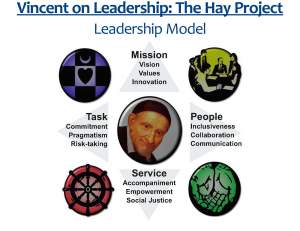Vincent and John C. Maxwell:
Unleashing Your Leadership Potential
.
 The writings of John C. Maxwell help us to further explore the four orientations of the Vincentian Leadership Model. Maxwell is an international leadership expert, speaker and co-founder of highly successful leadership training and development organizations, EQUIP and INJOY. A New York Times, Wall Street Journal and Business Week best-selling author, Maxwell has authored more than 50 books including two of his most popular works, Developing the Leader Within You and Leadership 101: What Every Leader Needs to Know. Maxwell’s faith is the foundation of his approach to life and leadership, much as it was for Vincent de Paul.
The writings of John C. Maxwell help us to further explore the four orientations of the Vincentian Leadership Model. Maxwell is an international leadership expert, speaker and co-founder of highly successful leadership training and development organizations, EQUIP and INJOY. A New York Times, Wall Street Journal and Business Week best-selling author, Maxwell has authored more than 50 books including two of his most popular works, Developing the Leader Within You and Leadership 101: What Every Leader Needs to Know. Maxwell’s faith is the foundation of his approach to life and leadership, much as it was for Vincent de Paul.
The Vincentian Leadership Model draws on Vincent’s legacy as a remarkable leader whose life and leadership continues to inspire us today. The four orientations of the model—Mission, People, Task and Service—illuminate and deepen our understanding of contemporary leadership practices proposed by Maxwell and others.
Mission
The competencies of vision, values and innovation are associated with the Mission orientation of the Vincentian Leadership Model. According to Maxwell, vision is an essential component of effective leadership. He urges everyone to ask the important questions and listen to the inner voice for answers. This will help individuals to discern a mission that will stir the heart and fuel the fire within (2002, 70). He asks:
“Do you know your life’s mission? What stirs your heart? What do you dream about? If what you’re pursuing doesn’t come from a desire within—from the very depths of who you are and what you believe—you will not be able to accomplish it.” (2002, 73-75)
People
Maxwell’s approach to leadership is grounded by the integral role of people. “The study of leadership is the study of how men and women guide people through uncertainty, hardship, disruption, transformation, transition, recovery, new beginnings, and other significant challenges.” (1993, 93)
Maxwell further suggests that two of the most important jobs of a leader are empowering people by sharing knowledge and resources, and motivating people to aspire to greater heights. He writes:
“Empowering is giving your influence to others for the purpose of personal and organizational growth…It’s seeing people’s potential, sharing your resources with them, and showing them you believe in them completely.” (2002, 77)
Leadership is not at all about position and power. Real leadership, according to Maxwell, is being the person others will gladly and confidently follow (ibid. 30).
Service
Service is central to Maxwell’s approach to leadership. He suggests selfless leaders such as Princess Diana and Mother Teresa are perfect examples of leaders who have properly used their influence—not their power—to create positive change.
Maxwell warns leaders against using their position alone to accomplish organizational objectives, especially in volunteer organizations. “Positional leadership doesn’t work in volunteer organizations. If a leader doesn’t have leverage—or influence—then he [she] is ineffective.” (ibid.28) Instead, Maxwell suggests there are 5 levels of leadership which help us understand the need to develop influence as a leadership skill:
1.Position/Rights –
People follow because they have to.
2.Permission/Relationships –
People follow because they want to.
3.Production/Results –
People follow because of what you’ve done for the organization.
4.People Development/Reproduction –
People follow because of what you have done for them.
5.Personhood-Respect –
People follow because of who you are and what you represent (highest level which leaders should aspire to).
Task
There are sure to be challenges when working towards any goal in life. Maxwell recommends placing our focus on the results of reaching the goal rather than the difficulty of the work. “Anytime you concentrate on the difficulty of the work…you are likely to become discouraged…Count the benefits of doing what’s right, and then dive in.” (ibid.48)
Another important practice, Maxwell suggests, is for leaders to evaluate the requirements, return, and reward for any project. (1993, 26-27).
Now with these comments by Maxwell in mind, let us remind ourselves of how Vincent illustrated the orientations and competencies of the Vincentian Leadership Model in his own life.
Vincent’s Leadership
Vincent energized and empowered others to support his vision for organized charity to the poor. He was driven by a strong desire—a burning fire—to serve others. Through mentorship and guidance he helped others such as Louise de Marillac, to find and pursue their mission in life.
Organized efforts and organizations such as The Daughters of Charity were the result. Vincent said, “If we are really called to carry the love of God far and wide, if we are to enflame the nations with this fire, if we have the vocation of setting the whole world on fire, if it is so, I say, if it so, …then how much I must myself burn with divine fire!”
Vincent was adept at helping his followers realize their potential. He empowered them by sharing his knowledge and resources, inspiring them through mission, and giving them opportunities to lead organizations he helped to create.
According to those who knew him, Vincent was humble, yet full of zeal. He was able to inspire and encourage others to join him in his persona mission, despite the challenges.
Over the course of many years, Vincent was able to inspire both the rich and poor to join him in his work. To the Ladies of Charity, he said, “Put off your jewels and fine clothing. Visit the poor and treat them openly and respectfully as persons of quality, avoiding all stiffness. To spend money is good, but we have not really begun to serve the poor until we visit them personally.”
![]() Vincent often approached his work with pragmatism and nuanced thinking that empowered others to act in spite of the challenges they faced. He believed in the virtue of action and loved to use this succinct motto: TOTUM OPUS NOSTRUM IN OPEERATINE CONSISTIT (Action is our entire task).
Vincent often approached his work with pragmatism and nuanced thinking that empowered others to act in spite of the challenges they faced. He believed in the virtue of action and loved to use this succinct motto: TOTUM OPUS NOSTRUM IN OPEERATINE CONSISTIT (Action is our entire task).
To learn more about the Vincentian Leadership Model and to assess your strengths in Mission, People, Service, and Task, please visit our website at leadership.depaul.edu.
Reflection Questions
How is the work you are doing right now connected to the fire in your heart?
What have you done recently to empower someone with whom you work?
How often do you ask others on your team about how you can be of help to them?
In what ways do you see your leadership first as service?
Resources:
Maxwell, John C. Developing the Leader Within You. Tennessee: Thomas Nelson 1993
____________. Leadership 101: What Every Leader Needs to Know. Tennessee: Thomas Nelson 2002
Edited by Patricia M. Bombard, BVM, D.Min., Director, Vincent on Leadership: The Hay Project, DePaul University, Chicago, IL USA



